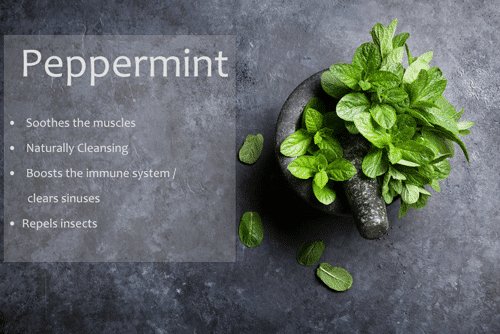15 Science-Backed Benefits of Peppermint
Who doesn’t love the refreshing flavor of peppermint?

Peppermint is refreshing, delicious, cooling, soothing, and rejuvenating. Its distinctive flavor has made it the quintessential taste of toothpaste and mouthwash.
Now, we associate peppermint with fresh breath.
But peppermint has so many more benefits than freshening breath. The active ingredients menthol and menthone are highly therapeutic.
Clinically speaking, it’s useful because of its antimicrobial and anti inflammatory properties.
There are hundreds of scientific studies on peppermint and its benefits.
Let’s look into the top 15 reasons on why you should use more peppermint in your life.
1. Relieves Nausea
Peppermint has long been used for nausea relief. To get the benefits of nausea relief from peppermint, you can use is in any form – fresh, dried, ingested or topically.
Studies have shown using peppermint oil in aromatherapy is also an effective and natural way to relieve upset stomachs.
2. Relieves Headaches
Peppermint oil is a powerful remedy for headaches. A study revealed that patients experienced significant headache relief, when peppermint and eucalyptus oils were mixed and applied to their forehead and temples.
3. Soothes Muscle Soreness
Peppermint oil is often added to topical pain relievers due to its powerful ability to overwhelm the senses and block pain receptors.
Studies have shown that it helps those recovering from intense exercise, soothe achy muscles, and recover faster.
4. Naturally Cleansing
Peppermint is antimicrobial and therefore are very effective in killing bacteria. It can be added to your homemade cleaning products or diffused to help purify the air.
5. Boosts Your Immune System

In addition to its natural antibacterial properties, peppermint is also great for giving your immune system a boost!
Drink peppermint tea or add peppermint to your food to get better immune system support.
6. Clears Up Sinus Issues
Peppermint is great for relieving congestion, due its high menthol content. Studies have shown that breathing in peppermint offers instant, natural congestion relief.
Peppermint also helps relieve secondary symptoms, such as itchiness and sneezing.
7. Repels Insects
Looking for a natural way to keep mosquitos away? Harsh chemicals in my insect repellants are terrible for your health.
Peppermint is an effective natural alternative. Try adding peppermint oil to your wrists or add it to some water and use it as a spray.
This way you won’t be exposing yourself or your family to terrible chemicals like DEET.
8. Treats Lice
Peppermint, clove, cinnamon, and tea tree oils have all been proven to be effective options for treating lice. Studies have shown that peppermint is toxic to lice and can safely kill them.
You can add peppermint oil to shampoos or vinegar mixtures to kill off head lice without harsh chemicals.
9. Improves Focus & Energy
Peppermint is great for improving focus and boosting energy. One study found that peppermint can improve reaction time and focus.
That same study also saw an improvement in overall athletic performance after peppermint oil aromatherapy.
Peppermint is full of surprises!
10. Soothes Itchy Skin
In a study of pregnant women who suffered from itchy skin and rashes, relief was found caused by using peppermint oil for its cooling effects.
Try adding a few drops of peppermint oil to a carrier oil such as jojoba or coconut oil and rub the mixture on itchy skin for fast relief.
11. Naturally Freshens Breath
We know peppermint is a common breath freshener but most don’t realize it’s more than just the delightful smell.
It is beneficial to overall oral health by killing off bad breath-causing bacteria. Studies have revealed that peppermint effectively fights oral pathogens and helps you maintain good oral health.
12. Improves Memory
 Studies have shown that peppermint significantly helps cognitive performance and memory.
Studies have shown that peppermint significantly helps cognitive performance and memory.
Peppermint also helps prevent burnout when concentrating for long periods of time.
Try diffusing peppermint oil at the office or have a cup of peppermint tea during the afternoon slump for a pick-me-up without caffeine.
13. Treats Irritable Bowel Syndrome
Peppermint has many therapeutic impacts when consumed.
Peppermint is effective in helping those suffering from irritable bowel syndrome and other gut health issues.
Atrantil a botanical supplement for gas and bloating uses peppermint for it’s gut soothing effects.
14. Supports Cancer Treatment
A study of menthol, a predominant characteristic, showed it had potential to reduce and stop the growth of cancerous cells.
While there needs to be more studies like this on the impact of peppermint and cancerous cell growth, this study adds to the growing list of reasons we love peppermint.
15. Promotes Hair Growth
Studies have shown that peppermint naturally promotes hair growth without any negative side effects. You can easily add a few drops to your shampoo and reap the benefits of peppermint on your hair growth.
Peppermint has been used for thousands of years for its therapeutic properties.
Now that you know peppermint is more than just a pleasant taste, you can begin incorporating it into your life and enjoy these 15 science-backed benefits.
https://onlinelibrary.wiley.com/doi/10.1046/j.1365-2648.1997.t01-15-00999.x/abstract
https://www.ncbi.nlm.nih.gov/pubmed/7954745
https://www.ncbi.nlm.nih.gov/pmc/articles/PMC3607906/
https://www.sciencedirect.com/science/article/pii/S1878535211000232
https://www.umm.edu/health/medical/altmed/treatment/aromatherapy
https://www.ncbi.nlm.nih.gov/pmc/articles/PMC4103722/
https://www.ncbi.nlm.nih.gov/pmc/articles/PMC3059459/
https://www.ncbi.nlm.nih.gov/pubmed/9439284
https://www.ncbi.nlm.nih.gov/pmc/articles/PMC4103722/
https://www.ncbi.nlm.nih.gov/pmc/articles/PMC3813175/
https://www.ncbi.nlm.nih.gov/pmc/articles/PMC4054083/
https://www.ncbi.nlm.nih.gov/pubmed/18041606
https://www.ncbi.nlm.nih.gov/pubmed/17420159
https://www.ncbi.nlm.nih.gov/pubmed/18955132
https://www.ncbi.nlm.nih.gov/pmc/articles/PMC4289931/